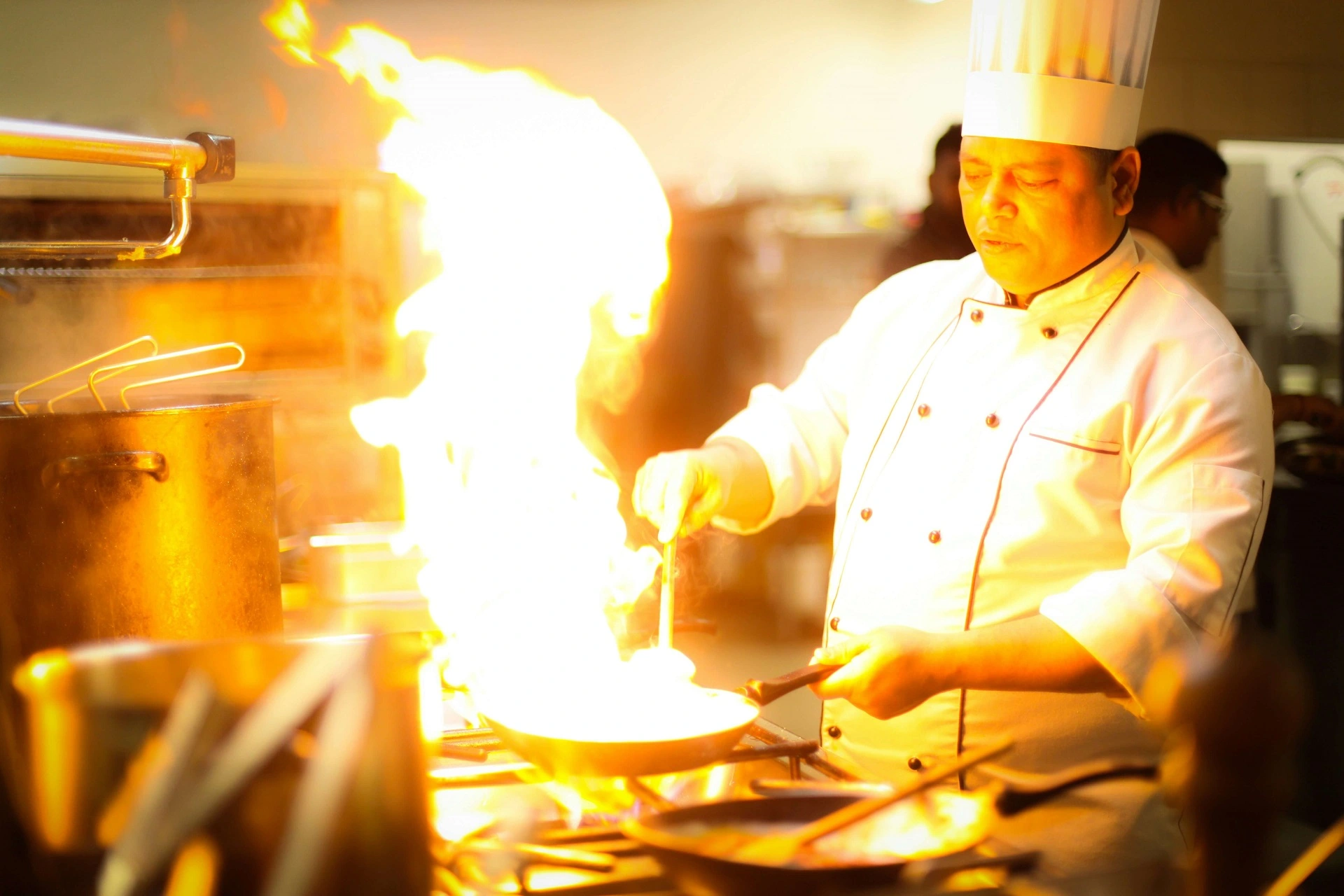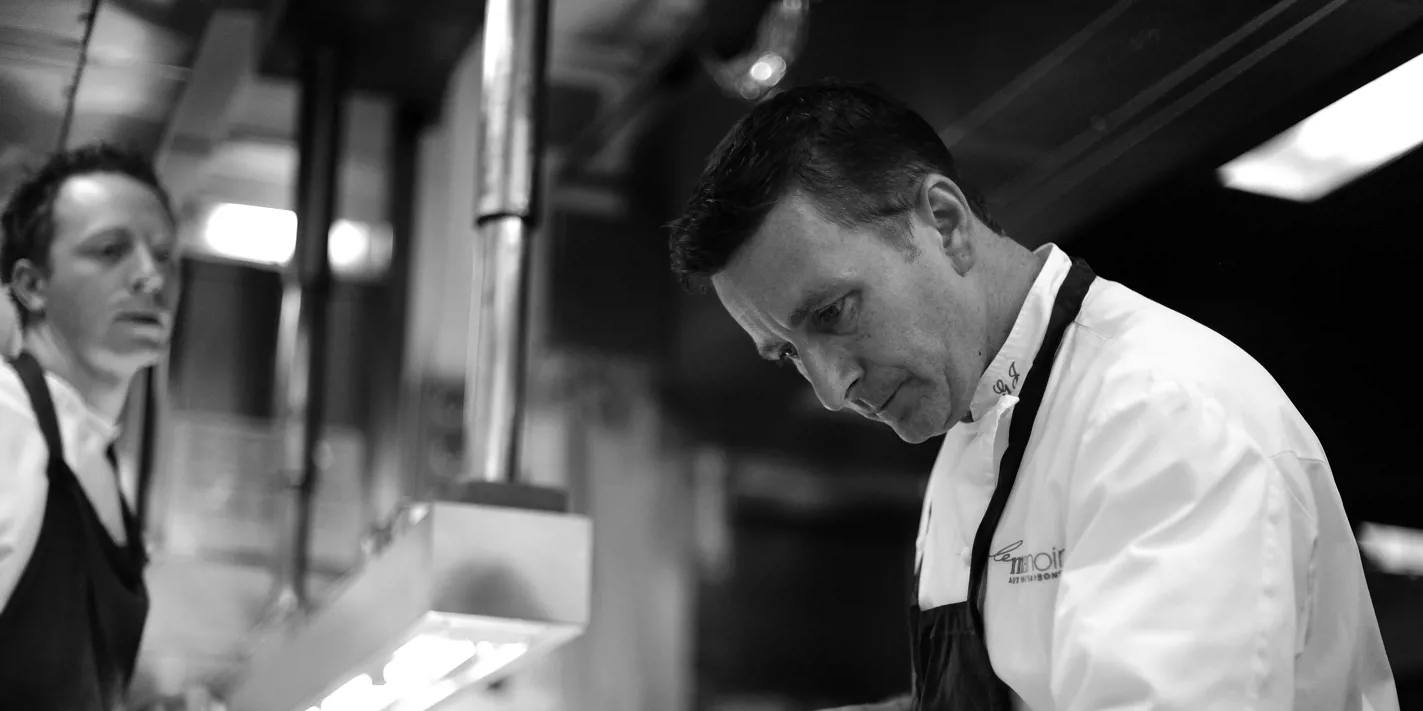The kitchen was a war zone that night. Orders piled up, pans clattered, and the air hung heavy with tension. The sous chef, an intolerable aggressive oaf at the best of times, slammed a plate onto the counter, sauce splattering everywhere. ‘Redo!’ he barked. ‘And hurry!’ In the chaos and the heat, I had two choices: crumble under pressure or rise to the challenge.
“If you can’t stand the heat, get out of the kitchen.” It’s a phrase often thrown around, but in professional kitchens, it’s not just a metaphor—it’s a reality. Kitchens are pressure cookers of stress, noise, and constant motion.
I have seen grown men break down in tears or erupt in terrifying anger, and more than once did I reach a point where I thought I could not go on, where the pressure and the exhaustion were just too much to bear. You’ve been at it for 10 hours straight. Your feet hurt, your back is killing you, your hands cut to bits from shelling langoustines all morning. The chef de partie is shouting at you that you’re chopping the chives wrong, while the sous chef screams at her that she screwed up on a dish that just got sent back, which in turn angers the whole brigade as they all need to now redo the dishes they’ve sent out to that table. Even without the third degree burns and blood-gushing cuts that happen on really bad nights, kitchens can at times be mayhem.
Yet, in the middle of the chaos and exhaustion, I discovered something invaluable: resilience. Each intense moment became a lesson, teaching me to stay grounded, think on my feet, and keep moving forward—no matter the circumstances.
Lesson 1: Keep Moving Forward
In the kitchen, unexpected things happen, not all of them mistakes. A sauce gets scorched, a plate gets dropped, or an order gets misfired, sure. But it can also be equipment breaking down, a colleague dropping out due to an accident, or something as mundane as a guest eating slower than expected, throwing your timetable in disarray. The clock doesn’t stop, and neither can you.
At Le Manoir, the timetable for service was truly intimidating. From the moment a guest arrived, the clock would start ticking. Within the first minute of arriving, the welcome canapes and champagne had to be served and, as soon as the guests had chosen their meal, the kitchen would work to a strict number of minutes between each course. Mere minutes between amuse bouche and first starter, marginally longer between the fish and meat mains. Of course, all guests at the table have to be served at the same time, with dishes arriving in perfect condition.
For the team, this meant achieving perfect synchronicity – along with a perfect execution of the dish – every single order. One station falls behind by a minute, and the head chef will declare all the remaining orders on that table as unfit to serve, because they’ve been on the pass longer than they should. And so, the orders for the whole table need to be prepared again to ensure they all go out at the same time, in perfect condition.
One of the head waiters only job was to shuttle between kitchen and front of house, to inform the head chef of any delays to the time table caused by guests themselves. “The gentleman on table 12 is talking a lot, slow the mains by 3 minutes.” At least one station will be restarting their order for this table, since they put the duck in the oven 3 minutes before the warning arrived. “The lady on table 3 has gone out for a cigarette.” Same story.
Resilience in this context isn’t about avoiding mistakes; it’s about how quickly you recover from an unexpected occurrence. Burnt the sauce? Start over. The plate’s broken? Re-plate it. The lady’s gone to powder her nose? Regroup and start again. Each event becomes a moment to adapt, and this applies in all areas of life. The ability to pivot quickly is what keeps everything running smoothly.
Lesson 2: Focus on the Task at Hand
During a busy service, distractions are everywhere: the tickets piling up, the shouting from the pass, the pan that’s suddenly too hot. The key to resilience is narrowing your focus to what’s right in front of you. One plate, one dish, one step at a time, while still maintaining full awareness of what is happening around you by engaging all your senses as you work.

At Leith’s, they train this skill through the mandatory time plan without which you are not allowed to cook in the kitchen. Preparing a time plan forces you to visualize the job ahead of time. It sounds obvious, but by going through each step in your mind the night before, you know exactly where you are at and what is coming up next, at any given moment. You might physically be going through the motions for the first time, but for your brain you’ve been there before. Similar visualization techniques are used, for the same reasons, by top athletes. Running the race in your mind, or running it in real life, the brain training is the same.
This mental preparation allows you to more easily enter what is nowadays trendily called flow state. You are at one with your environment, your knife is an extension of your hand, your nose registers the changes in aromas as the bread is nearly ready, a quick glance tells you the sauce needs just a few more minutes, you hear the water come to the boil ready for the pasta. Meanwhile, you’ve finished prepping the fish and have a 3-minute gap to clear your station ready for bringing the meal together and plating it for service.
It’s about staying present, blocking out the noise, but letting through the important signals, and channeling your energy into the task at hand. This focus not only keeps you grounded but also helps you avoid being overwhelmed by the bigger picture.
Flow state is quite addictive: the more time you’re in it, the more you want to experience it. When I returned to corporate life, I found I really missed practicing this ability to simultaneously maintain a narrow focus and a broad awareness. With its obsession with multitasking, the meetings about meetings, the revisions to revisions, the water cooler gossip and office politics, I often felt that corporate life lacked the “here-and-now”, “do what’s in front of you”, “one foot in front of the next” presence of mind that I had been trained in over the previous four years.
Lesson 3: Build Your Mental Stamina
When I started my first consultancy business a couple of years later, and I found out how overwhelming it is to suddenly be solely in charge of everything, I started practicing meditation to deal with the intensity of it all. From having a clear job description and a steady monthly wage, now the job description is “anything that comes up and needs doing” and even when you do everything right, you may still have no income at the end of the month.
With so many things coming at me at once, the pressure to perform, the stress of not knowing whether it’ll all come good at the end, it all reminded me of the heat of the kitchen. And so, where meditation helped me remember to stay centred, with singular focus, my training in the kitchen helped me realize that “doing what is in front of you” builds the mental stamina required to remain calm when life gets overwhelming.
Mental stamina is where true resilience lives. It’s the ability to keep your cool when the fryer breaks or when an unexpected VIP table comes in. It’s the capacity to start over when things don’t work out, the ability to respond when the unexpected happens. Building mental stamina takes practice: learning to breathe through the chaos, staying calm under pressure, and finding moments to regroup amid the frenzy.
This moment of realization – finding myself applying lessons from Leith’s and tapping into the forever forward mentality from my time at Le Manoir, to handle the stress of running my own business – was when the seed was first planted that lessons from the kitchen can be applied to teach resilience in business and, why not, in life.
Lesson 4: Lean on Your Team
No one survives the kitchen alone. The brigade system—a highly organized team structure—is designed for resilience. Everyone has a role, and when one person struggles, others step in. Knowing you have people to lean on isn’t just comforting; it’s essential. The same is true outside the kitchen. Resilience is a team sport.

Today, at Shutta, every new member of the team, including (or maybe especially) the interns on their first day at the Ajax Academy – our in-house intern program – will receive the “You will F up speech”. Nobody enjoys failure, and while some cultures embrace it fully, like the Japanese, most cultures abhor it. In Vietnam, like most of Asia, failure is associated with losing face and so best kept hidden from authority.
Having learned that we need the same resilience to be successful in business as you do in kitchens, I spend a good hour laying out our expectation that everyone on the team will fail, at some point, and likely will fail again in a different way soon after that. Team members who have heard the speech before take great joy in telling stories about all the times that I royally screwed up and had to own it. You join our company, and we force you to look failure in the face, to suck it up and own your part in it, and to proactively seek support, accepting an extended hand to lift you back up. Because at the end of the day, like the kitchen brigade, we stand and fall together.
Lesson 5: Learn from the Heat
Over time, I realized that every challenging service wasn’t just a test but an opportunity to refine my skills and develop resilience that would serve me far beyond the kitchen.
Every tough service teaches you something, every failure at work is a lesson—about yourself, your limits, and your ability to bounce back. Over time, you start to see challenges as opportunities to grow. It takes practice to face challenges head on, but like everything you practice, the more you do it, the better you become. The heat doesn’t get easier, but you get stronger.
Beyond the Kitchen
Resilience isn’t confined to the walls of a kitchen. Whether you’re navigating a tough project at work, handling personal challenges, or facing the unexpected, the lessons from the kitchen apply. Keep moving forward, focus on what’s in front of you, and don’t be afraid to lean on others when you need support. The heat of the kitchen—and of life—might be intense, but it’s where growth happens, transforming pressure into strength and resilience into success.


